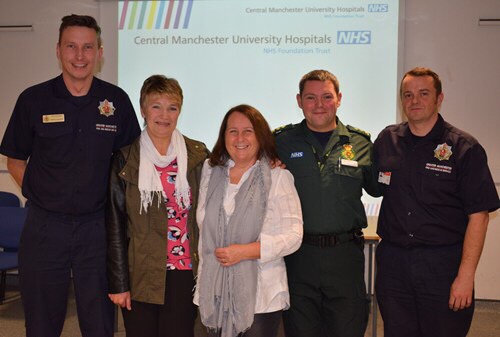A passer-by who recognised that a stranger had collapsed in the street after suffering a cardiac arrest has been reunited with the lady whose life she helped to save.
On the afternoon of November 18, Janet Beatty was walking past Gorton Railway Station after visiting a friend, when she suddenly lost consciousness and fell to the floor. A group of people nearby went to her aid and attempted to put her into the recovery position.
At the same time Debra Bushell walked nearby to see Janet lying on the floor and also rushed over to help. Immediately she noticed that Janet had suffered a cardiac arrest and performed the initial cardio pulmonary resuscitation (CPR) which saved her life.
Debra recalls what happened: “I was just on my way to pick up my car from the garage and I walked around the corner to see a lady on the floor with a few people gathered around her, they asked if I could help and I thought yeah, I can do something as I’d had first aid training. Someone nearby said she was breathing and they could feel a pulse in her neck, but when I lifted her chin up, checked the airway and looked at her chest she wasn’t breathing.
“Someone was already on the phone to the ambulance service and I told them to say she wasn’t breathing. The person on the phone then asked if I knew how to do chest compressions and I said yes, so I just pushed her on to her back, lifted her chin up and started the compressions.
“It was strange as I wasn’t nervous at all, I just got into this little bubble and could hear all the kafuffle in the background but I kept going until I heard the sirens and knew it wouldn’t be very long before help arrived.”
John Carrie, a Senior Paramedic from North West Ambulance Service was part of the ambulance crew that arrived on scene that day and describes the fantastic work done by Debra: “When Janet collapsed it wasn’t initially relayed to our control that it was a cardiac arrest, it was only her checks and additional information that enabled us to send the appropriate emergency response.
“Debra started what we call the chain of survival, that’s the early recognition, early access and then the early basic life support of someone doing chest compressions and pressing hard and fast. These are the first vital starting links to getting a good outcome and saving a life.
“What then follows was the great team effort from our ambulance crew with the support from our colleagues at Greater Manchester Fire and Rescue, who for a year now also attend alongside us for call outs to Red 1 incidents of cardiac arrests. Firefighters Steve Dalton and Marc Berry took over the CPR from Debra, as we got to work doing the more technical clinical skills; it was a complete team effort.”
Firefighter Steve Dalton said: “After taking over from Debra, myself and my colleague, Marc, continued to rotate CPR to assist the paramedics. Thankfully Janet’s heart started beating again and she also started breathing – a brilliant team achievement.”
Janet was rushed by ambulance to Manchester Royal Infirmary and has gone on to make a full recovery. She says: “I just fell and really can’t remember anything about what happened. I hadn’t been ill and it’s strange as when people have a heart attack they get some sort of warning like chest or arm pains or perhaps start sweating. I had nothing and I had thought that my heart was alright. I am just incredibly lucky and thankful that Debra happened to be walking past at that moment.”
John goes on to say that anyone can perform CPR and encourages everyone to learn how to do first aid: “Very often it’s the basics done well that works. Some first aiders will teach you how to do compressions and mouth to mouth, but you wouldn’t necessarily want to do that to a complete stranger. In this case Debra did chest compressions only. She kept going and doing them well – that was the most important and effective part. Just having that courage to have a go is enough as you can never make the situation worse.”







